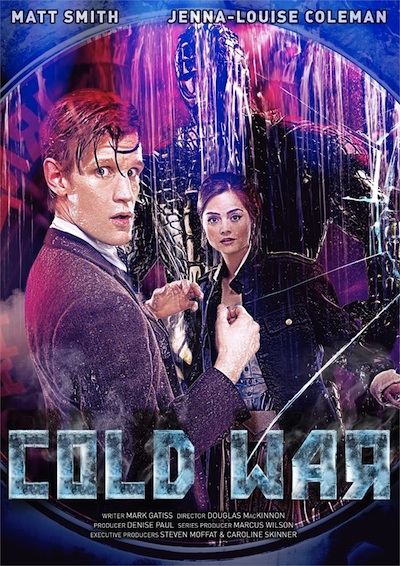 Personally, I do not look forward to Doctor Who episodes written by Mark Gatiss. His episodes are not usually terrible, just mediocre. Whenever he writes for Doctor Who or Sherlock, the episode feels very clinical—it hits all the right notes and plot points, but there is no emotion or excitement to give the episode some life to latch onto. This week’s episode, “Cold War,” does nothing to break that mold. I find that I enjoy his work as an actor more than as a writer. Fans will recognize him as Dr. Lazarus from “The Lazarus Experiment” in Series Three, as well as playing Mycroft Holmes in Sherlock.
Personally, I do not look forward to Doctor Who episodes written by Mark Gatiss. His episodes are not usually terrible, just mediocre. Whenever he writes for Doctor Who or Sherlock, the episode feels very clinical—it hits all the right notes and plot points, but there is no emotion or excitement to give the episode some life to latch onto. This week’s episode, “Cold War,” does nothing to break that mold. I find that I enjoy his work as an actor more than as a writer. Fans will recognize him as Dr. Lazarus from “The Lazarus Experiment” in Series Three, as well as playing Mycroft Holmes in Sherlock.
The year is 1983, and the world is locked in the heart of the Cold War. The Doctor and Clara accidentally appear on a Soviet submarine while intending to visit Las Vegas. I am not sure why they chose to reuse this; I got really distracted and bumped out of the episode since this is the exact way he opened his previous episode, “The Idiot’s Lantern.” The crew of the sub has uncovered an Ice Warrior (the name given to Martians in Doctor Who) which has been frozen in a block of ice. For some inane reason, they believe it to be a mammoth, despite the fact that it is bipedal and much smaller than a mammoth. My guess is that maybe this was a reference to a classic episode that I have not seen, but, even if it was, it should have just been cut.
The scientist (played by David Warner) who discovered the alien decides to wait until they return to Moscow to unthaw it. Sound advice that any intelligent and rational person would do. For a completely unknown reason, some sailor decides that he cannot wait to defrost the creature, and it is set loose to reek havoc on the crew. The rest of the episode feels mostly like the movie Alien, but not as good.
Obviously, with the introduction of a new companion, we are going to retread some waters since aspects of time travel need to be explained to them. In this episode, Clara is now learning about how time is fluid (or wibbly-wobbly) and history can change. The Doctor has to explain that if one of the nuclear missles goes off, it could ignite the Cold War and cause the end of the world as Clara struggles to understand how she could die in 1983 before she was born. This would be fine if Gatiss had not already done this almost exact conversation with the Doctor and Rose in “The Unquiet Dead.” In an attempt to move the plot along, this rehash, as well as other exposition, gets rushed, which ironically draws attention to itself and causes the audience to realize that we are being spoon-fed information so that we can get to the action.
This episode marked the first onscreen appearance of the Ice Warriors in nearly 40 years. While this was not one of my favorite episodes, I always appreciate when classic villains return to Doctor Who. The Ice Warriors were voiced by Nicholas Briggs, who also voices the Daleks and Cybermen. Once again he manages to give a great voice performance that enhances a terrifying alien race. The Ice Warriors’ armor did not get much of an update from their classic counterparts; however, we have now finally seen a Martian outside of his armor. Sadly, this turned out to be rather disappointing. The CGI looked cartoonish, and their bodies look disproportionate to the armor and makes one wonder how they fit inside.
Another thing resurrected in this episode was the TARDIS defense mechanism known as HADS (or Hostile Action Displacement System), which is what caused the TARDIS to disappear when danger arose. It just seemed like an obnoxious plot device used to explain why the Doctor would not just rescue everyone with the TARDIS and save the day within the first five minutes of the episode. Also, if the TARDIS disappears, then the Doctor and Clara should not still be connected to its translation matrix, and they would not be able to understand the Russian-speaking Soviets. And, while we are on the subject of languages, the Ice Warrior is inexplicably able to understand the Soviets, as well. Do they speak Russian on Mars? There just seems to be a lot of inconsistencies.

